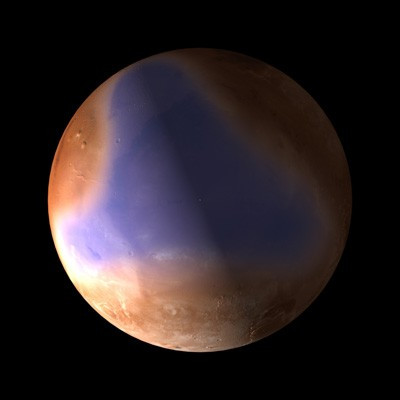Mars Once Had An Ocean

Europe Space Agency's (ESA) Mars Express spacecraft has shown strong evidence that there was an ocean that once covered a part of Mars.
Using MARSIS radar, which was deployed for collecting data in 2005, the spacecraft has detected sediments reminiscent of an ocean floor within the boundaries of previously identified, ancient shorelines on Mars, reports esa.
Jérémie Mouginot, Institut de Planétologie et d'Astrophysique de Grenoble (IPAG) and the University of California, Irvine, and colleagues analysed more than two years of data and found that the northern plains are covered in low-density material.
"We interpret these as sedimentary deposits, maybe ice-rich," says Dr Mouginot. "It is a strong new indication that there was once an ocean here."
The researchers claim that there were two oceans on Mars, one four billion years ago, when warmer conditions prevailed, and the other three billion years ago, when subsurface ice melted following a large impact, creating outflow channels that drained the water into areas of low elevation.
The more recent ocean would have been there for a million years or less as the the water would have either frozen back in place and been preserved underground again, or turned into vapour and lifted gradually into the atmosphere, Mouginot explained.
"MARSIS penetrates deep into the ground, revealing the first 60-80 metres of the planet's subsurface," says Wlodek Kofman, leader of the radar team at IPAG.
"Throughout all of this depth, we see the evidence for sedimentary material and ice."
Accoring to the esa, the sediments that were revealed were areas of low radar reflectivity and such sediments are typically low-density granular materials that have been eroded away by water and carried to their final destination.
"Previous Mars Express results about water on Mars came from the study of images and mineralogical data, as well as atmospheric measurements. Now we have the view from the subsurface radar," says Olivier Witasse, ESA's Mars Express Project Scientist.
"This adds new pieces of information to the puzzle but the question remains: where did all the water go?"
© Copyright IBTimes 2024. All rights reserved.






















